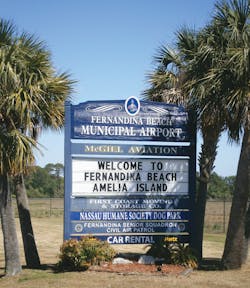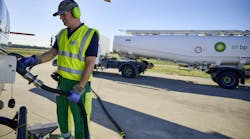PULLQUOTES:
… the working relationship between the city and the FBO is the best it has ever been.
Sean McGill, president, McGill Aviation
An FBO and an airport serve as a front door to the community and traveling public.
Have you ever visited Fernandina Beach, Fla.? It is a uniquely Floridian resort destination on Amelia Island that boasts upscale hotels and spas; pristine beaches; festivals galore; a world-class car show; unlimited golf; and a boutique downtown crammed with history, shopping, restaurants and charm.
Located three nautical miles (6 km) south of the central business district of Fernandina Beach, you can find Fernandina Municipal Airport (FBMA), a city-owned, public-use airport and designated reliever airport for Jacksonville International Airport. Fernandina Beach Municipal Airport was developed during World War II by the United States Navy F4U Cosair, and originally served as a training facility. Following World War II, the airport facilities were transferred to the City of Fernandina Beach in accordance with the provisions of the Surplus Property Act of 1944. Today, the airport supports the economic growth of Fernandina Beach and Amelia Island by providing direct air access availability to residents, business persons, tourists and conventioneers.
Upon visiting the solace FBO, McGill Aviation, one immediately notices this 21-year-old FBO’s professionalism in the construction and tree-trimming on the field. The pleasant experience continues upon entering the FBO facility where one cannot help but notice the congenial and supportive relationship between City Airport Operations Specialist, Robert Kozakoff, and FBO employees. This type of relationship is rarely the norm, so Airport Business dug into the McGill Aviation difference, and here is what we learned.
Focus on the FBO
The cohesive relationship one witnesses between McGill Aviation and city officials did not always exist. As a matter of fact, there were many stormy years fraught with challenges between the City of Fernandina Beach and the family-owned FBO, including seven years of litigation. McGill Aviation found itself, like many FBOs, trying to operate as a profitable business, within the adversarial constraints and communications barriers placed on it by a city board that lacked a solid understanding of what it took to profitably run an FBO. It goes without saying, that this bitterness was further reflected in the local community’s view of the airport and FBO.
But the tide changed for the better with the on-boarding of a new city manager, Joe Gerrity, in 2012. Gerrity has made it his mission to repair and rebuild the relationship between the two entities, and educate the public about the economic value the airport has in the community. He did so through transparency at public hearings and airport events that brought together the FBO, the airport and the community. Gerrity drew upon his own expertise as a former McDonald’s franchisee and a businessman with a keen appreciation for the FBO and airport as viable business entities that must profit, to demonstrate how these businesses benefit the community.
Communicate Commitment to the City
Equally as committed to bringing the city and FBO together for the betterment of all parties involved, and the community at large, were FBO Owner John McGill and his son, Sean McGill, president of McGill Aviation. Despite years of disagreement over leaseholds and fuel pricing, the McGill’s believe that when the island does well, the airport and the FBO also do well. And today, they are grateful to have good people to work with within the city whose prevailing attitudes are in sync with their own.
Being located at a coastal resort airport gives this FBO a unique niche, where the McGill’s serve a customer base that is 80 to 90 percent transient. In contrast, most FBOs serve a smaller transient customer base and a much greater tenant base. This niche has fostered a strong desire to invest in a newer modern facility designed to complement the city’s plan to build a new ramp and welcome center. The McGill’s wish list also includes transient hangars, a restaurant, a conference center, and possibly an on-field hotel.
But a fly in the ointment remains. With only five years left on their 20-year lease, and no new long-term lease on the horizon, investing in improved facilities is left in a holding pattern; there is not enough leasehold to realize a financial return on investment.
Even so, Sean, who runs day-to-day FBO operations, reports that the working relationship between the city and the FBO is the best it has ever been. “We would not want to go back to how it has been in past years,” he says.
Going forward, Sean mentions he hopes to establish processes and procedures to ensure the FBO and the city continue to move in the right direction. He stresses that he wants to make sure the improved communication between the two does not deteriorate as people within the city hierarchy and political environment change.
Though site improvements remain at a standstill, the FBO still focuses its efforts on bettering the airport and the community. McGill Aviation participates in airport-sponsored events, such as the Ben Byrns 5K Runway Rally, and allows on-site parking for up to 1,700 cars during the Amelia Concours D’ Elegance, a world-class car show held at the Ritz-Carlton.
The benefits of such partnerships are huge. For example, the show draws hundreds of private aircraft into the airport, which are serviced by the FBO. The city benefits because attendees patronize local hotels, restaurants, shopping areas, and a host of other city merchants, supporting the local economy. Leasing or lending property for use by the community also helps the airport. For instance, leasing property for youth soccer fields and the Humane Society has had a positive effect on the public’s opinion of the airport and the facilities located on it.
Focus on the Future
A few issues threaten this new-found partnership, however.
As with any airport, Fernandina Beach city government and McGill Aviation could benefit by from a documented mission-vision statement that includes a requirement for open communications and transparency. This document would ensure that when local politics change, the mission-vision remains stable, keeping the continued direction and partnership between the airport and FBO intact.
A long-term lease between McGill and the airport is also needed. To sustain profitability and make continued improvements to its own facility, and ultimately the airport, an FBO requires the assurance of long-term leasehold commitments to realize a return on their investment.
But overall all parties are in a good position to make sure this relationship continues to be a win-win for everyone. McGill Aviation’s attitude of service to others and its support of the local community, resorts, island businesses, and Fernandina Beach organizations, positions this FBO as a valuable asset to the City of Fernandina Beach. On the flip side, the city has become an integral part of airport activity involving the FBO and is aware of the high level of customer service the FBO provides, which is consistent with the other resort businesses such as hotels, spas and golf courses serving travelers to the island.
An FBO and an airport serve as a front door to the community and traveling public. Everyone involved can chose to make that door a warm inviting one to pass through, thereby creating loyal repeat customers and visitors, resulting in a growing city economy, or they can chose a more adversarial path that impedes growth. McGill Aviation and the Fernandina Municipal Airport have found that a warm, inviting, open door is the clear choice.
BIO: DeborahAnn Cavalcante, diversified aviation consulting, Aviation Training Academy
DeborahAnn Cavalcante leads Diversified Aviation Consulting (DAC) and along with her associates has firsthand experience in air carrier operations, private charter aircraft, general aviation operations, military/civilian interface, FBO management, maintenance repair station training, safety training, human factors training, and customer service training. For more information on DAC visit www.dac.aero.





